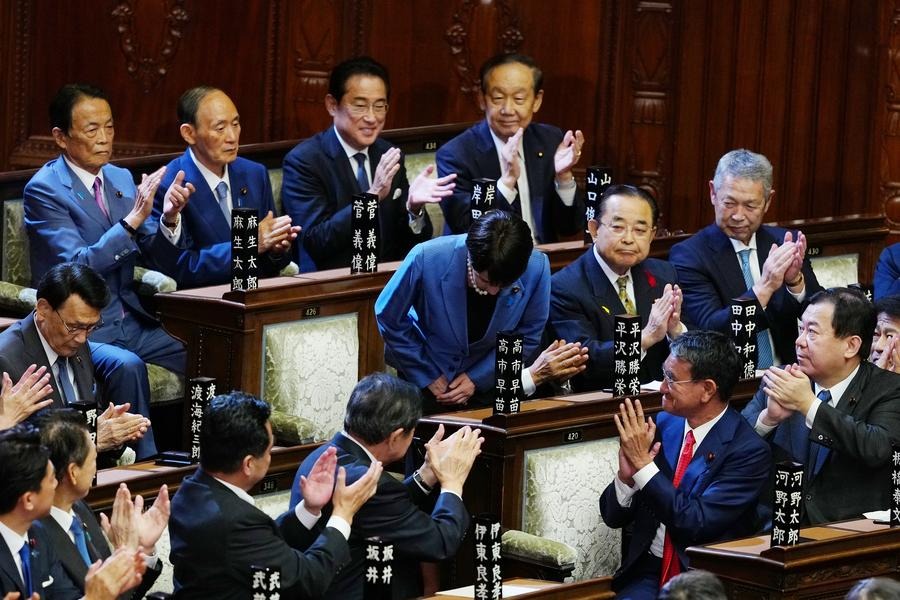At a pivotal point


The SCO faces both new challenges and new opportunities from the Ukraine crisis
As the Ukraine crisis continues to escalate, the Shanghai Cooperation Organization's influence in international and regional affairs is increasing, making it a priority choice for regional countries to participate in multilateral cooperation.
Amid the complex and volatile international and regional situations, the SCO region is entering an important period of power restructuring and reordering. The SCO member states have an increasingly active attitude toward SCO policies, and the organization is at a pivotal point of transformation and upgrading.
At present, the United States is beefing up containment of China and Russia, stepping up efforts to create new alliances and new orders, and pushing the world toward the dangerous edge of split and confrontation.
The "Shanghai Spirit" — nonaligned status, non-targeting against a third country, and advocating openness, consensus, trust, mutual benefit, equality and mutual respect — is actively implemented by the SCO. It is by no means a diplomatic rhetoric. It represents a new type of international organization and the value of upholding true multilateralism, transcends the Cold War mentality and imperial thinking, provides effective solutions for the global problems of our time, and spearheads for a new round of global and regional governance.
The Ukraine crisis is an unprecedented challenge the SCO is facing since its founding in 2001, as the geopolitical conflict has posed severe challenges to the SCO's endeavors to ensure regional security and promote regional development.
To start with, as Russia's ties with the US and the West move toward "all-round confrontation", properly handling and managing the US factor and the West factor have become extremely urgent for the SCO.
The Ukraine crisis has brought the US and Europe closer. They have joined hands to contain Russia, and taken the initiative in major-power competition within the region.
Second, affected by cascading crises like the upheaval in Afghanistan, the COVID-19 pandemic and Kyrgyzstan's regime change, the SCO region faces notably increased instability and uncertainty.
The Ukraine crisis has further added to the already troubled security situation in the region. In the meantime, non-traditional security issues have become more prominent in the region, with turbulence in global energy and food markets exacerbating regional countries' energy and food security concerns.
Third, the SCO member states have yet to rise above the economic woes caused by the sluggish global and regional economy reeling from the prolonged COVID-19 pandemic. The economic woes of the SCO member states have been further exacerbated by the Ukraine crisis.
While posing daunting challenges for the SCO, the Ukraine crisis has also brought new opportunities and new hope for the organization's further development.
In the face of major-power competition, SCO member states, not willing to be pushed around, have been stepping up efforts to cooperate. They have been advancing domestic reform, increasing the capability for independent development, and striving to become an important force in the regional landscape.
Against the headwinds from the pandemic and the Russia-Ukraine conflict, leaders of Central Asian countries held the Fourth Consultative Meeting of the Central Asian Heads of States. Following the summit, documents including the Treaty of Friendship, Good Neighborliness and Cooperation for the Development of Central Asia in the 21st century, the Regional Green Agenda Program for Central Asia, the Concept of Interaction of the Central Asian States at the multilateral formats were signed. This showcases their desire and unwavering resolve to "huddle for warmth" and jointly respond to challenges.
Amid a more fragmented international order caused by the Ukraine crisis, the SCO is becoming a priority choice in multilateral cooperation for its member states, especially the Central Asian countries, as its guiding principles and ideas are increasingly appealing. A quicker pace in membership expansion has further enhanced the SCO's influence in global and regional affairs, laying a more solid foundation for the organization to expand cooperation and increase its voice in regional and global affairs.
It's worth noting that since the outbreak of the Ukraine crisis, the SCO member states aspire to continue their "power-balancing diplomacy" — they wish to neither follow the US to counter Russia, nor support Russia to use the SCO as a weapon against the US and the West. Central Asian countries hope the SCO can play a bigger role in ensuring security and helping them rise above the economic distress and revive the economy.
Meanwhile, against the backdrop of the Russia-Ukraine conflict, Central Asian countries are pinning greater hopes on China, bringing new hope for advancing regional cooperation under the SCO framework. In this context, it has become a significant, urgent task for China to seize the opportunities to promote the SCO to play a more active role in regional and global governance, and safeguard security, stability and development in China's surrounding areas.
To start with, China should continue to uphold the principles of non-alliance, non-confrontation and not targeting at any third parties, and vigorously promote a new model of international relations among SCO member states.
Second, China should implement the new vision for security with concrete actions and ramp up efforts to build common security.
China should attach top priority to security cooperation within the SCO and take more effective measures to deepen such cooperation with more practical outcomes.
Third, China needs to advance regional economic collaboration against the headwinds to achieve common development.
China should double down on its efforts to advocate and carry out sub-regional, mini-multilateral cooperation, and explore new ways to rise above problems in economic cooperation through such new means as demonstration zones and bases. Furthermore, the cooperation areas should be constantly expanded. Cooperation in emerging areas of 5G technologies, smart cities, artificial intelligence and e-commerce should be boosted to open new horizons for cooperation.
Last, China should make greater efforts to advance reforms within the SCO to promote the organization's transformation and upgrading, by vigorously promoting reforms.
The author is secretary-general of the China Center for Shanghai Cooperation Organization Studies and a research fellow at the China Institute of International Studies. The author contributed this article to China Watch, a think tank powered by China Daily. The views do not necessarily reflect those of China Daily.
Contact the editor at editor@chinawatch.cn


































